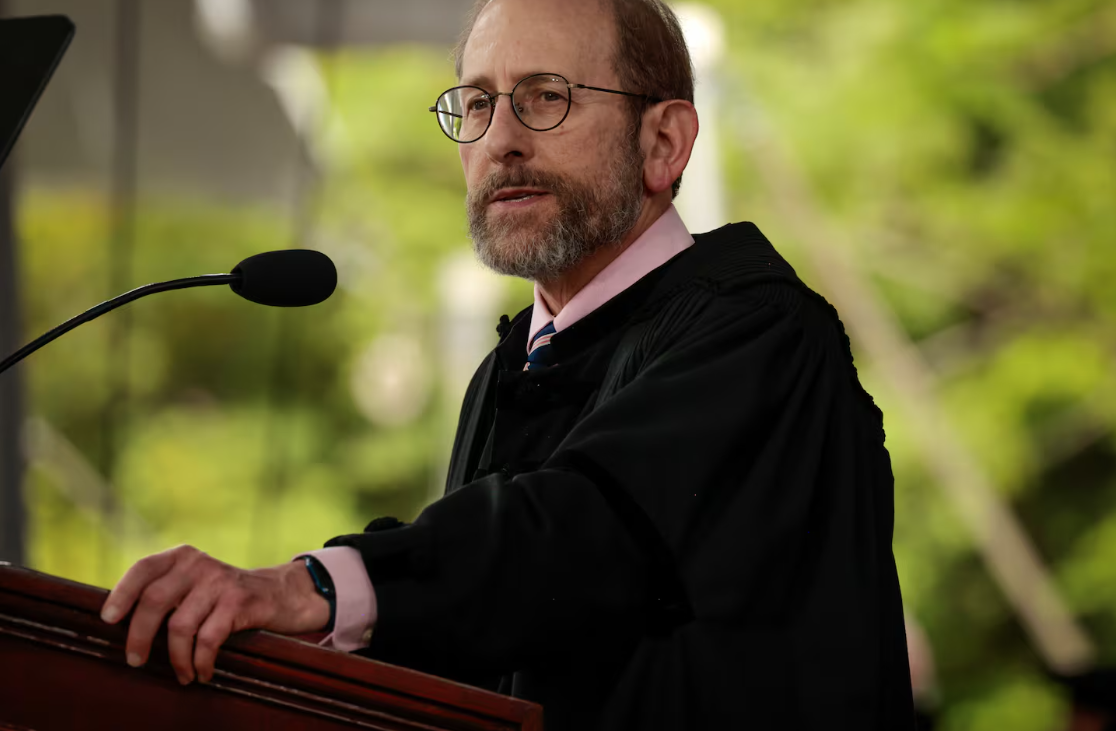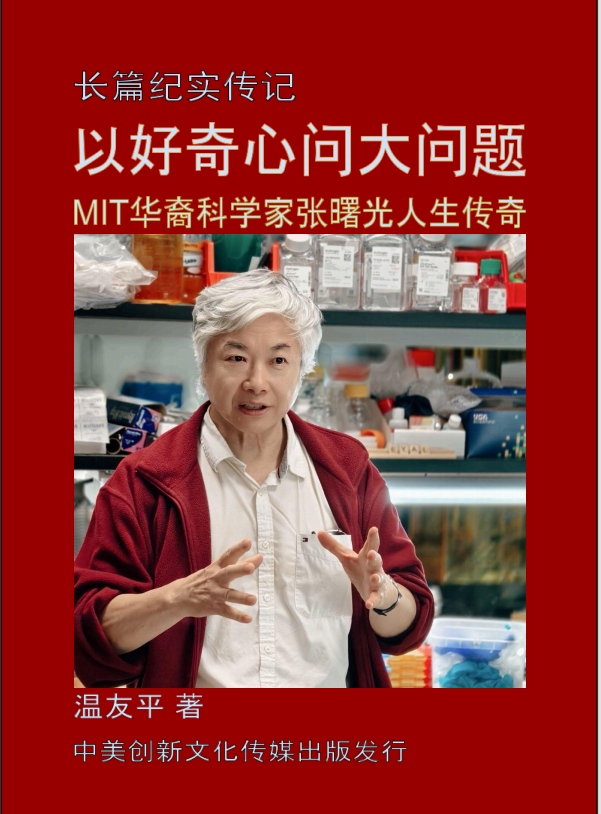哈佛大学的艾伦·加伯将继续担任校长至 2027 年

【中美创新时报2024 年 8 月 3 日编译讯】(记者温友平编译)周五,哈佛大学宣布艾伦·加伯(Alan Garber)将继续担任校长三年,他在历史上动荡的春季学期中证明了自己是一股稳定的力量。《波士顿环球报》记者希拉里·伯恩斯对此作了下述报道。
去年 1 月,哈佛大学面临一系列重大危机,包括首位黑人校长在短暂任职后辞职,该校任命了一位受过培训的医疗经济学家,担任临时校长。
周五,哈佛大学宣布艾伦·加伯将继续担任校长三年,他在历史上动荡的春季学期中证明了自己是一股稳定的力量。
这一决定对许多教职员工来说并不意外,他们认为正是他结束了哈佛大学为期三周的学生抗议活动,而没有遭到警察突袭。让加伯继续留任也为大学争取了时间,学校领导希望华盛顿对精英高等教育机构的审查会逐渐淡化,校园里对中东战争的愤怒也会逐渐平息。
“这是可以预见的,”种族和非裔美国人历史教授哈利勒·纪伯伦·穆罕默德 (Khalil Gibran Muhammad) 说,他将在秋季学期结束后离开哈佛前往普林斯顿大学。“在 [前校长] 克劳迪娜·盖伊 (Claudine Gay) 辞职后的最初几天,大学已经表明它将非常谨慎地应对政治攻击,而他在过去几个月里一直如此。在我看来,加伯是一位制度主义者,也是一位深思熟虑、倾向于保守、规避风险的领导者。”
哈佛公司高级研究员彭妮·普利兹克 (Penny Pritzker) 在给校园社区的一封信中表示,该大学将于 2026 年春末开始寻找他的继任者。
“这是一个充满挑战的时代,我们之间充满激情和紧张的关系,”加伯在周五的一条消息中说。“但我知道我们有能力一起找到前进的道路,因为我们都热爱学习,也因为我们认识到多元化是我们的力量源泉。”
加伯来自伊利诺伊州罗克岛,从 2011 年到今年 1 月一直担任教务长。
盖伊在国会听证会上表现糟糕,学术论文被指控抄袭,她辞职后,哈佛大学面临少数直言不讳的捐赠者、保守派政治家和一些犹太校友的强烈批评,他们担心哈佛大学在喧闹的亲巴勒斯坦抗议活动后处理校园反犹太主义的方式不当。许多学生和教师还担心伊斯兰恐惧症,包括外部行为者对亲巴勒斯坦抗议者进行人肉搜索。
许多人认为,加伯在执掌哈佛的初期稳定了哈佛的局面。他召集了工作组来解决反犹太主义和伊斯兰恐惧症的问题,采取中立政策,防止学校领导人公开表态,并努力澄清哈佛在学术自由和校园抗议的界限方面的立场。
4 月,当数十名学生在哈佛园搭起帐篷,抗议加沙的死亡人数,并呼吁大学撤资以色列资产时,加伯拒绝满足他们的要求,尤其是撤资。但与新英格兰和全国各地的许多同龄人不同,在毕业典礼临近的长达三周的抗议期间,他也拒绝向警方求助。
他的支持者说,加伯的性格恰到好处,能给今年秋天的校园带来平静,许多人预计示威活动将再次升温,总统竞选活动给高等教育机构带来了更大的压力。他们希望他能帮助支离破碎的校园社区愈合伤痛。
“我很高兴,”哈佛大学心理学教授史蒂芬·平克说。“他在艰难的环境中表现得非常出色。他拥有哈佛目前需要的平衡、冷静和清晰思考问题的能力。”
并非所有人都同意。许多学生、工作人员和教职员工不赞成大学领导层处理结束亲巴勒斯坦营地的谈判的方式。学生抗议者指责加伯欺骗他们,向营地参与者保证,如果他们离开校园,他们将能够按时毕业。然而,学院的纪律委员会继续禁止一些抗议者与同学一起领取毕业证书。
此后,大多数学生的纪律指控已被撤销,但一些学生表示,他们已经不再信任加伯。
哈佛大学即将升入大三的努里尔·维拉·德格拉夫(Nuriel Vera-DeGraff )表示,他担心加伯到目前为止还不愿意与那些为加沙死亡人数而感到痛苦的学生和教师接触。据巴勒斯坦卫生当局称,以色列对哈马斯的战争于 10 月 7 日造成约 1,200 名以色列人死亡,另有 250 人被扣为人质,夺走了近 40,000 名加沙人的生命。维拉·德格拉夫说,学生们呼吁大学公开其投资,以便他们能够看到“我们的学费是否用于资助种族灭绝”。
维拉·德格拉夫希望看到大学官员向那些感到被欺骗的抗议者发出“正式道歉”,并希望大学公开其捐赠基金的投资。
“我明白撤资很复杂,不可能立即发生,”维拉·德格拉夫说。“我认为披露投资是最直接的选择。”
一些犹太学生仍然担心校园环境对与以色列有关系的人不利。哈佛大学即将升入大三的 查理·科维特(Charlie Covit )表示,他对哈佛取消参加露营活动的学生的停学决定“非常失望”。他希望看到哈佛“明确列出违反规则的后果,然后在违反规则时真正实施后果。”
“我希望,现在加伯拥有完全的校长权力,他最终愿意认真对待犹太社区的担忧,”科维特说。
萨姆·莱辛(Sam Lessin)是前 Facebook 高管,也是哈佛校友,今年早些时候曾竞选大学监事会席位,但未获成功,他对加伯实施的一些变革表示赞赏。莱辛说,其中一项变化是,哈佛大学申请表上增加了一个新论文题目,促使未来的学生反思如何与持相反观点的人打交道。许多人认为,新的论文题目承认哈佛大学在推动复杂问题的文明讨论方面还有许多工作要做。
“他的优先事项是正确的……推动哈佛大学重新走向学术卓越、言论自由和制度中立,”莱辛说。“他有正确的价值观,[而且]他是一位有效的领导者。我不会说哈佛是一个完全改革的地方,未来还有很多挑战,但他一直在不断推动着哈佛的进步。”
题图:哈佛大学校长艾伦·加伯于 5 月在该校第 373 届毕业典礼上向人群发表讲话。Craig F. Walker/Globe Staff
附原英文报道:
Harvard’s Alan Garber to stay on as president until 2027
By Hilary Burns Globe Staff,Updated August 2, 2024
Last January, when Harvard faced a series of epic crises, including the resignation of its first Black president after a brief tenure, the university tapped its cerebral provost, a health care economist by training, to be its interim leader.
On Friday, Harvard announced that Alan Garber, who proved a stabilizing force amid a historically tumultuous spring semester, would stay on as president for another three years.
The decision came as no surprise to many faculty, who credit him with ending Harvard’s three-week student protest encampment without a police raid. Keeping Garber on also buys the university time, during which its leaders hope the scrutiny in Washington on elite higher education institutions will fade, and the furor on campuses over the war in the Middle East will cool.
“This was very predictable,” said Khalil Gibran Muhammad, a professor of race and African American history who is leaving Harvard for Princeton after the fall semester. “In the earliest days after the resignation of [former president] Claudine Gay, the university had already shown that it was going to be very cautious in its response to the political attacks, and he has remained so throughout these many months. Garber is an institutionalist and a thoughtful, conservative-leaning, risk-averse leader, in my opinion.”
The university will launch a search for his successor in late spring 2026, Harvard Corporation Senior Fellow Penny Pritzker said in a message to the campus community.
“This is a challenging time, one of strong passions and strained bonds among us,” Garber said in a message Friday. “But I know that we are capable of finding our way forward together because we share a devotion to learning and because we recognize our pluralism as a source of our strength.”
Originally from Rock Island, Ill., Garber served as provost from 2011 until January.
After Gay’s resignation, following her disastrous performance at a congressional hearing and allegations of plagiarism in her academic work, the university faced intense criticism from a handful of vocal donors, conservative politicians, and some Jewish alumni concerned about the university’s handling of antisemitism on campus following raucous pro-Palestinian protests. Many students and faculty were also concerned about Islamophobia, including the doxxing of pro-Palestinian protesters by outside actors.
Garber is seen by many as having steadied Harvard during those early days in charge. He convened task forces to address concerns about antisemitism and Islamophobia, adopted a policy of neutrality to prevent the school’s leaders from taking public stands on current events, and worked to clarify Harvard’s position on academic freedom and the limits of campus protest.
When several dozen students set up tents in Harvard Yard in April to protest the death toll in Gaza and to call on the university to divest from Israeli assets, Garber refused to budge on their demands, particularly divestment. But unlike many of his peers in New England and around the country, he also declined to lean on police during the three long weeks of the protest, as commencement approached.
His supporters say Garber has the right temperament to bring a sense of calm to the campus this fall, when many expect demonstrations to heat up again, and the presidential campaign heightens pressure on higher education institutions. They hope he can help the fractured campus community heal.
“I’m delighted,” said Steven Pinker, a Harvard psychology professor. “He’s done a superb job in trying circumstances. He has the right mixture of balance, calm, and clarity of thinking through issues that Harvard needs at this point.”
Not everyone agrees. Many students, staff, and faculty members disapprove of how university leadership handled the negotiations to end the pro-Palestinian encampment. Student protesters accuse Garber of deceiving them, assuring participants in the encampment they would be able to graduate on time if they cleared out of the yard. The college’s disciplinary board, however, proceeded to bar some protesters from receiving their diplomas with their peers.
Most of the student disciplinary charges have since been dropped, but some students have said they have lost trust in Garber.
Nuriel Vera-DeGraff, a rising junior at Harvard University, said he is concerned Garber so far hasn’t been willing to engage with students and faculty who are anguished about the death toll in Gaza. Israel’s war against Hamas, which on Oct. 7 killed about 1,200 Israelis and took another 250 hostage, has taken the lives of nearly 40,000 Gazans, according to Palestinian health authorities. Vera-DeGraff said students are calling on the university to disclose its investments so they can see “whether or not our tuition dollars are going toward funding a genocide.”
Vera-DeGraff would like to see university officials issue a “formal apology” to the protesters who felt deceived, and for the university to disclose its endowment investments.
“I understand divestment is complex and can’t happen immediately,” Vera-DeGraff said. “I think disclosing investments is the most straight forward option.”
Some Jewish students remain concerned about a hostile campus environment for those with ties to Israel. Charlie Covit, a rising junior at Harvard, said he was “very disappointed” Harvard canceled the suspensions of students who participated in the encampment. He would like to see Harvard “clearly lay out the consequences of breaking the rules, and then actually implementing the consequences when they’re broken.”
“My hope is that now that Garber has full presidential authority, he’ll be willing, finally, to take the concerns of the Jewish community seriously,” Covit said.
Sam Lessin, a former Facebook executive and Harvard alum who unsuccessfully pursued a seat on the university’s Board of Overseers earlier this year, applauded some of the changes Garber has instituted. One of the changes, Lessin said, is a new essay question on the university’s application that prompts prospective students to reflect on how they approach those with opposing viewpoints. Many view the new essay question as an acknowledgment that Harvard has work to do promoting civil discourse on complicated issues.
“His priorities are in the right place … in terms of pushing Harvard back towards academic excellence, free speech, institutional neutrality,” Lessin said. “He has the right values, [and] he’s been an effective leader. I wouldn’t say Harvard is a fully reformed place, and there’s a lot of challenging things ahead, but he’s delivered a consistent drumbeat of good improvements.”



